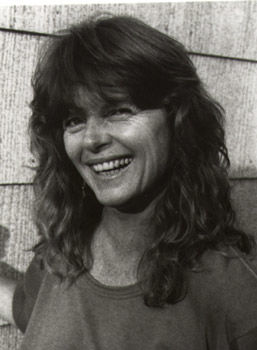Someone I love is dying, which is why,
when I turn the key in the ignition
and back the car out of the parking space
in the underground garage, and the radio
comes on, sudden and loud, something
by Haydn, a diminishing fugue, and maneuver
the car through the dimly lit tunnels
with their low ceilings, following the yellow arrows
stenciled at intervals on the gray cement walls,
I think of him, moving slowly through the last
hard days of his life and I can't stop crying.
When I arrive at the toll gate I have to make myself
stop thinking as I dig in my pockets for the last
of my coins, turn to the attendant, indifferent
in his blue smock, his white hair curling like smoke
around his weathered neck, and say Thank you,
like an idiot, and drive into the blinding midday light.
Everything is hideously symbolic,
and everything reminds me of cancer:
the Chevron truck, its rounded underbelly
spattered with road grit and the sweat
of last night's rain, the dumpster
behind the flower shop, its sprung lid
pressing down on dead wedding bouquets--
even the smell of something simple, coffee drifting
from the open door of a cafe and my eyes
glaze over, ache in their sockets.
For months now all I've wanted is the blessing
of inattention, to move carefully from room to room
in my small house, numb with forgetfulness.
To eat a bowl of cereal and not imagine him,
scrubbed thin and pale, unable to swallow.
How not to imagine the tumors
ripening beneath his skin, flesh
I have kissed, stroked with my fingertips,
pressed my belly and breasts against, some nights
so hard I thought I could enter him, open
his back at the spine like a door or a curtain
and slip in like a small fish between his ribs,
nudge the coral of his brain with my lips,
brushing over the blue coils of his bowels
with the fluted silk of my tail.
Death is not romantic. He is dying,
no matter how I see it, no matter
what I believe, that fact is stark
and one dimensional, atonal,
a black note on an empty staff.
My feet are cold, but not as cold as his,
and I hate this music that floods
the cramped insides of my car, my head,
slowing the world down with its
lurid majesty, transforming everything I see
into some sort of memorial to life,
no matter how ugly or senseless--
even the old Ford in front of me,
its battered rear end thinning to scallops of rust,
pumping black classical clouds of exhaust
into the shimmering air-- even the tenacious
nasturtiums clinging to a fence, vine and bloom
of the insignificant, music spilling
from their open faces, spooling upward, past
the last rim of blue and into the still pool
of another galaxy, as if all that emptiness
were a place of benevolence, a destination,
a peace we could rise to.
